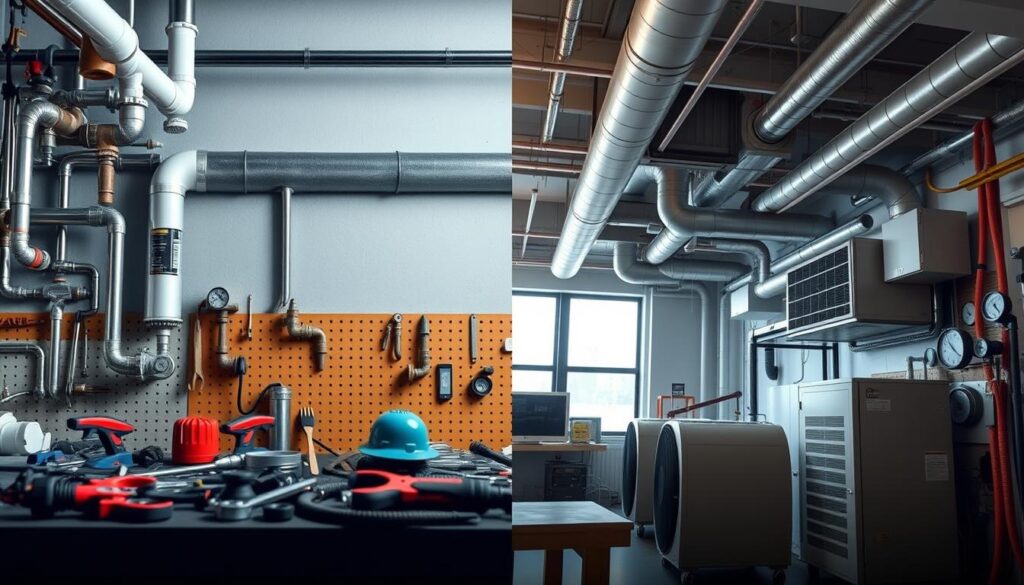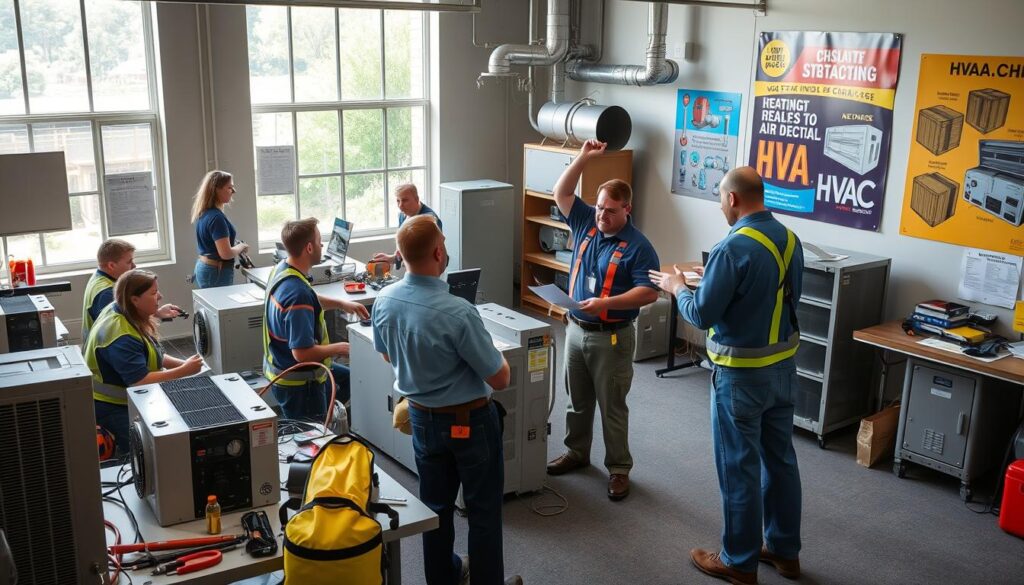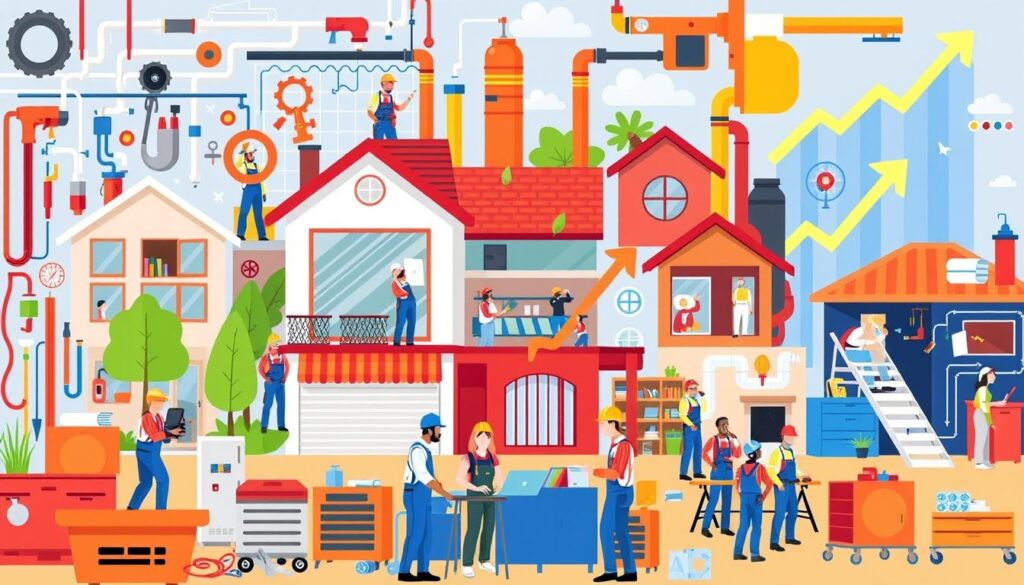Affiliate Disclosure
HVAC Guide Guys is a participant in the Amazon Services LLC Associates Program, an affiliate advertising program designed to provide a means for sites to earn advertising fees by advertising and linking to Amazon.
Does Plumbing or HVAC Make More Money? Thinking about a career in the skilled trades? Wondering if plumbing or HVAC (Heating, Ventilation, and Air Conditioning) pays better? This guide compares the salaries and growth chances of these sought-after jobs.

Both HVAC technicians and plumbers are key in the construction and upkeep fields. But, their pay can differ a lot. Plumbers get a median salary of $59,880 yearly, while HVAC techs earn $50,590. This $9,290 gap makes us ask: Does plumbing or HVAC make more money?
Key Takeaways
- Plumbers earn a higher median annual salary of $59,880 compared to HVAC technicians at $50,590.
- Both trades offer strong job growth, with HVAC and plumbing positions projected to increase by 5% over the next decade.
- Salaries can vary significantly by location, with high-cost areas often offering higher pay for skilled trade workers.
- Certifications, union membership, and overtime opportunities can significantly impact earnings in both the plumbing and HVAC industries.
- Factors such as industry demand, physical demands, and training requirements should also be considered when choosing between plumbing and HVAC careers.
Table of Contents
Understanding HVAC and Plumbing Career Paths
HVAC and plumbing are key in keeping our homes and buildings comfortable and working right. They are different jobs that need special skills and training. HVAC deals with heating, cooling, and air systems. Plumbing handles water systems, like pipes and sewage.
HVAC Technician Core Responsibilities
HVAC techs install, fix, and keep heating, cooling, and air systems running. They find and solve problems with furnaces, air conditioners, and more. They use tools like pressure gauges and welders to get the job done.
Plumber Essential Duties
Plumbers work on water systems. They install, fix, and keep pipes, fixtures, and sewage lines working. Their tasks include unclogging drains, fixing leaks, and replacing water heaters.
Key Differences Between Trades
HVAC and plumbing both need safety, but in different ways. HVAC techs deal with electrical and refrigerants, while plumbers face bacteria and wastewater. The tools they use are different too. HVAC techs use gauges and welders, while plumbers use wrenches and snakes.
Both hvac vs plumbing earnings and job needs show their special roles. They keep our places comfortable, efficient, and safe.
Does Plumbing or HVAC Make More Money: A Detailed Comparison
When comparing plumbing and HVAC trades, several factors matter. Blue-collar wages comparison, skilled trades income potential, and residential service trades compensation all affect earnings. These elements help decide which trade offers better pay.
Location and demand for services are key. Skilled trades income potential changes with the local cost of living and construction activity. Areas with high costs and lots of construction pay more for plumbers and HVAC techs.
Experience also plays a big role in residential service trades compensation. Beginners earn less, but as they gain skills and certifications, their pay goes up. Those with advanced skills, like master plumbers and HVAC specialists, earn the most.
| Skill Level | Plumber Average Salary | HVAC Technician Average Salary |
|---|---|---|
| Entry-Level | $40,000 – $50,000 | $35,000 – $45,000 |
| Mid-Career | $50,000 – $70,000 | $45,000 – $60,000 |
| Senior-Level | $60,000 – $90,000 | $55,000 – $75,000 |
Employment type also affects blue-collar wages comparison. Union jobs usually pay more and offer better benefits than non-union ones.
Choosing between plumbing and HVAC should consider more than just money. Both trades offer fulfilling careers with unique challenges and growth chances. The right choice depends on personal interests, strengths, and career goals in the skilled trades income potential.
Median Salary Analysis by Experience Level
When we look at the salaries of HVAC technicians and plumbers, experience matters a lot. At first, their starting pay is similar. But, as they gain more experience, the difference in their earnings grows.
Entry-Level Income Potential
HVAC technicians with little experience earn about $22.47 an hour. Those with over 10 years of experience make around $32.83 an hour. Plumbers start at $14.72 an hour. The most experienced plumbers can earn up to $37.46 an hour.
Mid-Career Earnings
As HVAC technicians and plumbers get more experience, their pay goes up a lot. HVAC technicians can make up to $77,920 a year. Plumbers can earn up to $104,000 a year.
Senior-Level Compensation
Senior HVAC technicians and plumbers earn a lot. HVAC technician managers with 10+ years of experience make about $68,286 a year. Master plumbers earn $85,100 a year. The highest earners can make up to $95,000 and $104,000 a year, depending on their skills and the local market.
| Experience Level | HVAC Technician | Plumber |
|---|---|---|
| Entry-Level (0-1 year) | $22.47/hour | $14.72/hour |
| Mid-Career (5-9 years) | $57,512/year | $61,550/year |
| Senior-Level (10+ years) | $68,286/year | $85,100/year |
| Top Earners | $95,000/year | $104,000/year |
The data shows that plumbers’ salary and hvac technicians’ income grow with experience and skills. This highlights the importance of ongoing learning and skill improvement in these rewarding fields.
Geographic Salary Variations Across the United States
Location greatly affects the pay for blue-collar jobs like plumbing and HVAC. In the U.S., salaries for these trades vary a lot. This is due to different job markets and living costs in each area.
In California, plumbers earn between $56,700 and $79,800 a year. In Alabama, the range is $49,100 to $69,200. Starting plumbers make about $52,000, but experienced ones can earn up to $73,200.
HVAC technicians also see big pay differences. The national average is $51,420, but it varies by region. In California, they make $63,920, while in Texas, it’s $49,900.
| State | Plumber Median Salary | HVAC Technician Median Salary |
|---|---|---|
| California | $56,700 – $79,800 | $63,920 |
| Alabama | $49,100 – $69,200 | N/A |
| Texas | N/A | $49,900 |
| New York | N/A | $63,210 |
| Florida | N/A | $49,280 |
| Illinois | N/A | $57,450 |
| Pennsylvania | N/A | $53,860 |
| Ohio | N/A | $51,750 |
| Georgia | N/A | $49,120 |
| North Carolina | N/A | $49,750 |
These differences show why it’s key to look at local blue-collar wages comparison when choosing a trade. Knowing the salary trends in your area can guide your career choices.
Education Requirements and Training Costs
Becoming an HVAC contractor or plumber takes a lot of education and training. Both careers need 3-5 years of apprenticeship. This includes both hands-on training and classroom learning. HVAC techs also get EPA certification for refrigerants and gas tech certification if they choose.
Plumbers usually don’t need extra certifications unless they work with gas lines. But, both HVAC and plumbing require ongoing education. This keeps them updated with new tech and code changes. HVAC contractors pay and plumbing trade income can grow with more knowledge and learning.
Certification and Licensing Expenses
HVAC techs must get EPA certification for refrigerants. This costs $150 to $500, depending on the type. Some states also need gas tech certification, adding to costs.
Apprenticeship Programs
Both HVAC and plumbing start with apprenticeships. Here, you get job training and a stipend for living expenses. Apprenticeships last 3 to 5 years, based on state and program rules.
Continuing Education Investment
Keeping up with industry changes is key for HVAC and plumbing pros. They might spend on ongoing training and certifications. This could be HVAC courses or plumbing code updates to stay ahead in the job market.

“The training cost to become an HVAC technician typically falls below $20,000 at the upper end, making it an affordable entry into the profession.”
Industry Growth and Job Security Analysis
The residential service trades, like plumbing and HVAC, are set for big growth. Climate change and old infrastructure are making people need these skills more. The national average salary for plumbers in the US in 2024 was $63,215 per year. States like Oregon, Alaska, and Massachusetts pay around $70,000 on average.
Starting plumbers make between $30,000 and $40,000 a year. Journeymen plumbers earn an average of $54,678 nationally. Master plumbers in the US make about $92,618 a year, with total income around $98,602 including overtime and bonuses.
The demand for skilled plumbers is on the rise, showing a bright future for the industry. In fact, manufacturing was up by 21% in 2024 over 2023 in the plumbing and HVAC industries. The sector is expected to grow by another 5% in 2025. As people’s financial situation improves, there’s more reason to be hopeful.
The HVAC industry is also growing. This is because of the need for better climate control due to climate change and the need for more energy-efficient systems. New tech, like smart home systems and advanced water recycling, is creating new, higher-paying jobs.
Job market analysis shows a job outlook for both plumbers and HVAC technicians in Ontario is rated 3 out of 5 stars. There are expected to be up to 2,000 job openings for each trade between 2023 and 2027. This shows a strong demand for skilled workers and good job security in these industries.
| Residential Service Trade | Average Salary | Job Growth Outlook |
|---|---|---|
| Plumbing | $63,215 (national average) | 3/5 stars (up to 2,000 job openings 2023-2027) |
| HVAC | $68,339 (national average) | 3/5 stars (up to 2,000 job openings 2023-2027) |

In conclusion, the residential service trades, including plumbing and HVAC, offer promising career prospects. They have strong job security and good earning potential. As demand for skilled workers in these fields keeps growing, those considering these blue-collar careers can look forward to a stable and rewarding future in the residential service trades.
Additional Income Opportunities and Benefits
HVAC technicians and plumbers can earn more than their base salary. They can get extra pay for overtime and emergency work. Being part of a union can also offer more benefits.
Overtime and Emergency Service Earnings
These tradespeople often work long hours, especially in busy seasons. Overtime pay can greatly increase their income. Emergency calls, even on weekends, can also bring in extra money.
Union vs. Non-Union Compensation
Being in a union can mean higher wages and better benefits. Members pay dues but get more in return. Non-union workers might have more freedom but less pay and benefits.
Benefits Packages Comparison
- Health insurance coverage
- Retirement plans (401(k), pension, etc.)
- Paid time off (vacation days, sick leave, etc.)
- Continuing education and training opportunities
- Discounted or subsidized tools and equipment
Employers offer different benefits packages. These can greatly affect job satisfaction and financial security. It’s important to compare these packages when choosing a job.
HVAC technicians and plumbers can increase their earnings. They can do this by working overtime, handling emergency calls, and joining unions. They should also look at the benefits packages offered by employers. This way, they can secure a stable financial future in their careers.
Working Conditions and Physical Demands
HVAC contractors and plumbers have unique jobs in the residential service trades. They face special working conditions and physical demands. Knowing these factors helps us understand the plumbing trade income and HVAC contractors pay better.
HVAC technicians work in very hot or cold places. They might be on rooftops in the summer or in attics in the winter. Plumbers usually work indoors but might face cramped spaces and bad smells. Both jobs need a lot of physical strength and the ability to move in tight spots.
It’s very important for both groups to have safety training. This helps protect them from harmful substances like refrigerants and chemicals. Following safety rules is key for their health and also affects their HVAC contractors pay and plumbing trade income.
- HVAC technicians often work in extreme temperatures, both hot and cold, while accessing rooftops and attics.
- Plumbers frequently operate in cramped spaces and handle sewage, requiring adaptability and resilience.
- Both trades demand physical strength to lift heavy equipment and work in uncomfortable positions.
- Comprehensive safety training is essential to mitigate risks associated with hazardous materials in HVAC and plumbing work.
The unique conditions and physical needs of HVAC and plumbing jobs affect their pay. Things like working in extreme weather, needing to be physically strong, and the importance of safety training all play a part. These factors make the residential service trades compensation different for HVAC contractors and plumbers.
Conclusion
Both HVAC and plumbing trades offer great career paths. They come with good salaries and strong job chances. HVAC techs might earn a bit less, but plumbers can make more, especially in big cities or specialized areas.
Choosing between these trades depends on what you like, your work environment, and your career goals. Both fields offer chances to grow, specialize, and earn well. With more people needing these services, now is a good time to look into does plumbing or hvac make more money and hvac vs plumbing earnings in the skilled labor earnings analysis.
Getting the right training, certifications, and keeping learning can boost your earnings. Hard work, dedication, and a focus on doing great work can lead to a fulfilling and profitable career in HVAC or plumbing.

